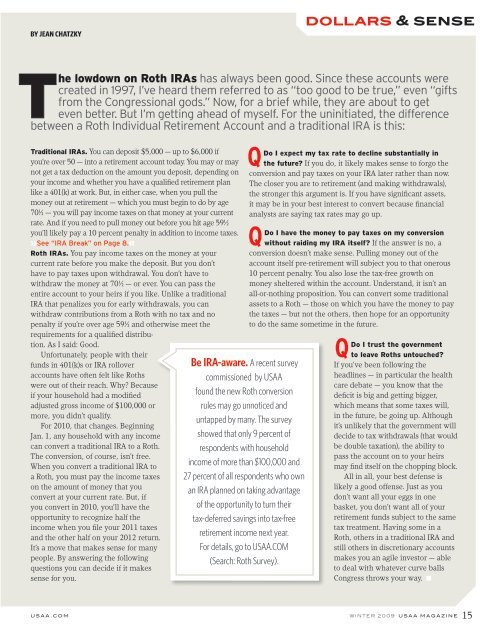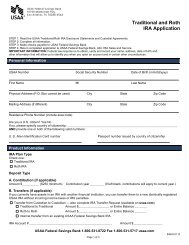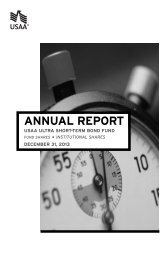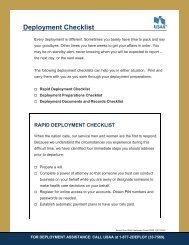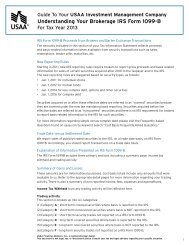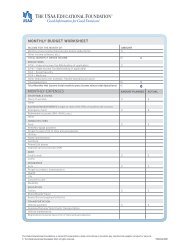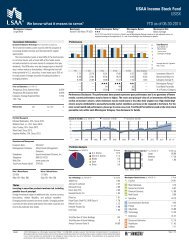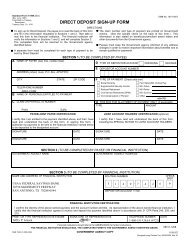Winter 2009 USAA Magazine - USAA.com
Winter 2009 USAA Magazine - USAA.com
Winter 2009 USAA Magazine - USAA.com
Create successful ePaper yourself
Turn your PDF publications into a flip-book with our unique Google optimized e-Paper software.
By Jean Chatzkydollars & senseThe lowdown on Roth IRAs has always been good. Since these accounts werecreated in 1997, I’ve heard them referred to as “too good to be true,” even “giftsfrom the Congressional gods.” Now, for a brief while, they are about to geteven better. But I’m getting ahead of myself. For the uninitiated, the differencebetween a Roth Individual Retirement Account and a traditional IRA is this:Traditional IRAs. You can deposit $5,000 — up to $6,000 ifyou’re over 50 — into a retirement account today. You may or maynot get a tax deduction on the amount you deposit, depending onyour in<strong>com</strong>e and whether you have a qualified retirement planlike a 401(k) at work. But, in either case, when you pull themoney out at retirement — which you must begin to do by age70½ — you will pay in<strong>com</strong>e taxes on that money at your currentrate. And if you need to pull money out before you hit age 59½you’ll likely pay a 10 percent penalty in addition to in<strong>com</strong>e taxes.»See “IRA Break” on Page 8.«Roth IRAs. You pay in<strong>com</strong>e taxes on the money at yourcurrent rate before you make the deposit. But you don’thave to pay taxes upon withdrawal. You don’t have towithdraw the money at 70½ — or ever. You can pass theentire account to your heirs if you like. Unlike a traditionalIRA that penalizes you for early withdrawals, you canwithdraw contributions from a Roth with no tax and nopenalty if you’re over age 59½ and otherwise meet therequirements for a qualified distribution.As I said: Good.Unfortunately, people with theirfunds in 401(k)s or IRA rolloveraccounts have often felt like Rothswere out of their reach. Why? Becauseif your household had a modifiedadjusted gross in<strong>com</strong>e of $100,000 ormore, you didn’t qualify.For 2010, that changes. BeginningJan. 1, any household with any in<strong>com</strong>ecan convert a traditional IRA to a Roth.The conversion, of course, isn’t free.When you convert a traditional IRA toa Roth, you must pay the in<strong>com</strong>e taxeson the amount of money that youconvert at your current rate. But, ifyou convert in 2010, you’ll have theopportunity to recognize half thein<strong>com</strong>e when you file your 2011 taxesand the other half on your 2012 return.It’s a move that makes sense for manypeople. By answering the followingquestions you can decide if it makessense for you.Be IRA-aware. A recent survey<strong>com</strong>missioned by <strong>USAA</strong>found the new Roth conversionrules may go unnoticed anduntapped by many. The surveyshowed that only 9 percent ofrespondents with householdin<strong>com</strong>e of more than $100,000 and27 percent of all respondents who ownan IRA planned on taking advantageof the opportunity to turn theirtax-deferred savings into tax-freeretirement in<strong>com</strong>e next year.For details, go to <strong>USAA</strong>.COM(Search: Roth Survey).QDo I expect my tax rate to decline substantially inthe future? If you do, it likely makes sense to forgo theconversion and pay taxes on your IRA later rather than now.The closer you are to retirement (and making withdrawals),the stronger this argument is. If you have significant assets,it may be in your best interest to convert because financialanalysts are saying tax rates may go up.QDo I have the money to pay taxes on my conversionwithout raiding my IRA itself? If the answer is no, aconversion doesn’t make sense. Pulling money out of theaccount itself pre-retirement will subject you to that onerous10 percent penalty. You also lose the tax-free growth onmoney sheltered within the account. Understand, it isn’t anall-or-nothing proposition. You can convert some traditionalassets to a Roth — those on which you have the money to paythe taxes — but not the others, then hope for an opportunityto do the same sometime in the future.QDo I trust the governmentto leave Roths untouched?If you’ve been following theheadlines — in particular the healthcare debate — you know that thedeficit is big and getting bigger,which means that some taxes will,in the future, be going up. Althoughit’s unlikely that the government willdecide to tax withdrawals (that wouldbe double taxation), the ability topass the account on to your heirsmay find itself on the chopping block.All in all, your best defense islikely a good offense. Just as youdon’t want all your eggs in onebasket, you don’t want all of yourretirement funds subject to the sametax treatment. Having some in aRoth, others in a traditional IRA andstill others in discretionary accountsmakes you an agile investor — ableto deal with whatever curve ballsCongress throws your way. nusaa.<strong>com</strong>winter <strong>2009</strong> usaa magazine15


